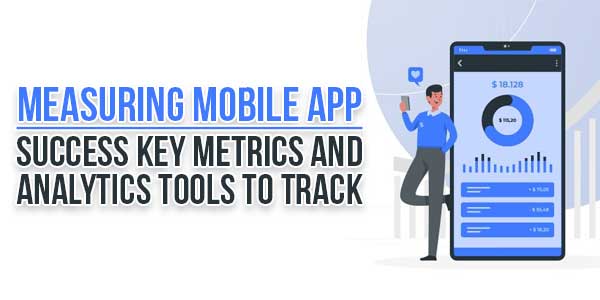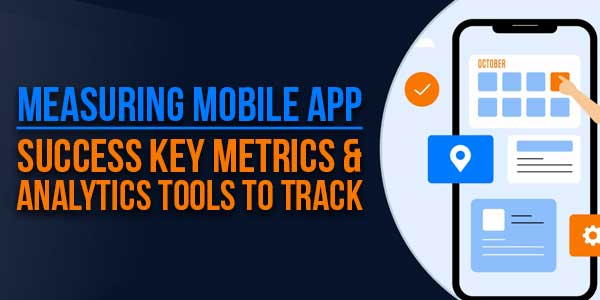
This is a must-read for you if you have a website that is soon turning into an app or your mobile app is life in the app store. Now that you have developed a suitable mobile app for our business, it’d be having some traction, some download, and a little feedback on the same.
But are you actually aware of how to successfully measure your app? Its success basically boils down to the main KPIs. They are one of the top mobile app metrics to help you decide the success of the app.
No matter what department you’re in, these general KPIs are being tracked by everyone involved in a team. Having said that, the weight of each KPI is totally dependent on the nature of the app and its stakeholders.
Table of Contents
Best Key Metrics:
1.) Mobile App Downloads:
Mobile app downloads would be the most obvious measure to check the success of an app. When you compare this metric, within the given period, it delivers a better metric. This KPI also measures how popular that app actually is.
For instance: If an app gets a million downloads in a year it will be more popular compared to the one that gets the same download in 10 years. The interpretation of this metric is different for everybody. The same number in 1 year can seem too much for a person while the same can be a bit slow for others.
Whatever the case is, you should track your app downloads as it points out the area which needs improvement. These areas include application development and enhancing marketing strategies.
2.) Installs:
Now that we are done with counting the download metric, it is still not an accurate representation of measuring the success of your mobile app.
For that, tracking the number of installations of the mobile app needs to be done. Google Analytics can be easily set up on both iOS and Android devices as well.
3.) Uninstalls:
Keeping the above point in mind, a number of uninstalls are also essential to keep track on. Uninstallation of apps is a major factor and the audience does that due to multiple reasons without leaving feedback in the majority of cases.
You can be aware based on the pattern and the timings of the app getting uninstalled. For e.g.: if the app gets uninstalled after an update or a modification, you have a clear sign regarding the reason. In some cases, uninstalls occur after some marketing campaign that is not well received by the audience.
Such metrics will help you in understanding how well your audience takes your application.
4.) Registrations:
Registrations are considered to be one of the milestones in the journey altogether. For a user, to download the app is one thing and to register themselves with their personal information is another. If you’re witnessing a number of increases in registrations, this means people are trusting your brand more and more now and are willing to purchase your service/product.
5.) Subscriptions:
Subscriptions would be the next step after registration. If you are witnessing growth in the number of your subscribers, this means people are willing to spend their money on your product/service.
This directly leans towards your revenue and then profits as well. Upon that, keeping track of how much time a user takes to generate the payment will help you in decoding the user behavior of your mobile app.
6.) Crashes:
Crashes as a metric directly reflect the technical aspects of the mobile app. Of course, this is something you’re not doing intentionally.
But sooner or later, crashes do take place. For that, keep a note/track of the number of crashes which will eventually help you in improving the performance of your mobile app. Thus, reflecting directly on the overall experience of users and retention rates as well.
7.) Upgrades:
Upgrades are not a big deal, they are expected to be there. Every business makes some or other upgrade in their services, time-to-time, and later rolls it out as an upgrade in the app. Some applications do have a range of premium offerings where a user needs to pay to buy premium.
In both cases, you can check the number of upgrades and compare it with the total number of active users within the given period of time. This, in turn, provides you with a great insight into how many users are willing to pay more for premium offerings.
However, you can also track the time a user takes to upgrade from free services to premium services. Such metrics give out some great insights into the user experience of your app.

Best Mobile App Analytics Tools:
With the bunch of mobile app analytics tools available, it can be difficult to select the best one for you. Here are the top 5 mobile app analytics tools to climb the success ladder.
App Annie:
App Annie is a mobile and data analytics platform that provides unbiased views of both your app’s data as well as other in-market apps as well. It supports iOS, Android, and Windows Phone with both paid and free subscription options as well.
App Radar:
App Radar makes your life so easy as it offers multiple tutorials regarding optimization ASO from scratch. You can do keyword trafficking and research to build the same. It works on iOS, Android, and Windows Phone as well.
Adjust:
Adjust is an analytics app designed to identify and create your user base. It has features such as tracking hourly trends, analyzing cohorts, and more. This supports Android, BlackBerry, HTML5, iOS, and Windows Phone
Firebase:
Firebase is Google’s mobile analytics app which is free and supports the development, improvement, and nurturing of apps by displaying all metrics in one central location. The platforms it supports are C++, iOS, Unity, and Android.
Tune:
The tune is a one-stop solution for measuring and engaging throughout a customer’s journey, tracking their movement in the app, and more. Tune supports Android, iOS, tvOS, Javascript, and Windows Phone.
Why Mobile App Analytics Are Important for Your Mobile App?
When you implement mobile app analytics, you will have all the necessary apps handy to understand your app’s performance better. Here are some key areas which can benefit you:
- Real-time ROI assessment
- Data-driven strategies
- Personalized strategies
- Goal tracking
Conclusion:
You can also hire a mobile application development company to help you out with all the technicalities and enhance your app’s success.

 About the Author:
About the Author:




![[Giveaway]-The-Easiest-Way-to-Backup-iPhone-Without-iTunes-Using-DearMob-iPhone-Manager](https://www.exeideas.com/wp-content/uploads/2019/04/Giveaway-The-Easiest-Way-to-Backup-iPhone-Without-iTunes-Using-DearMob-iPhone-Manager-300x150.jpg)







Be the first to write a comment.